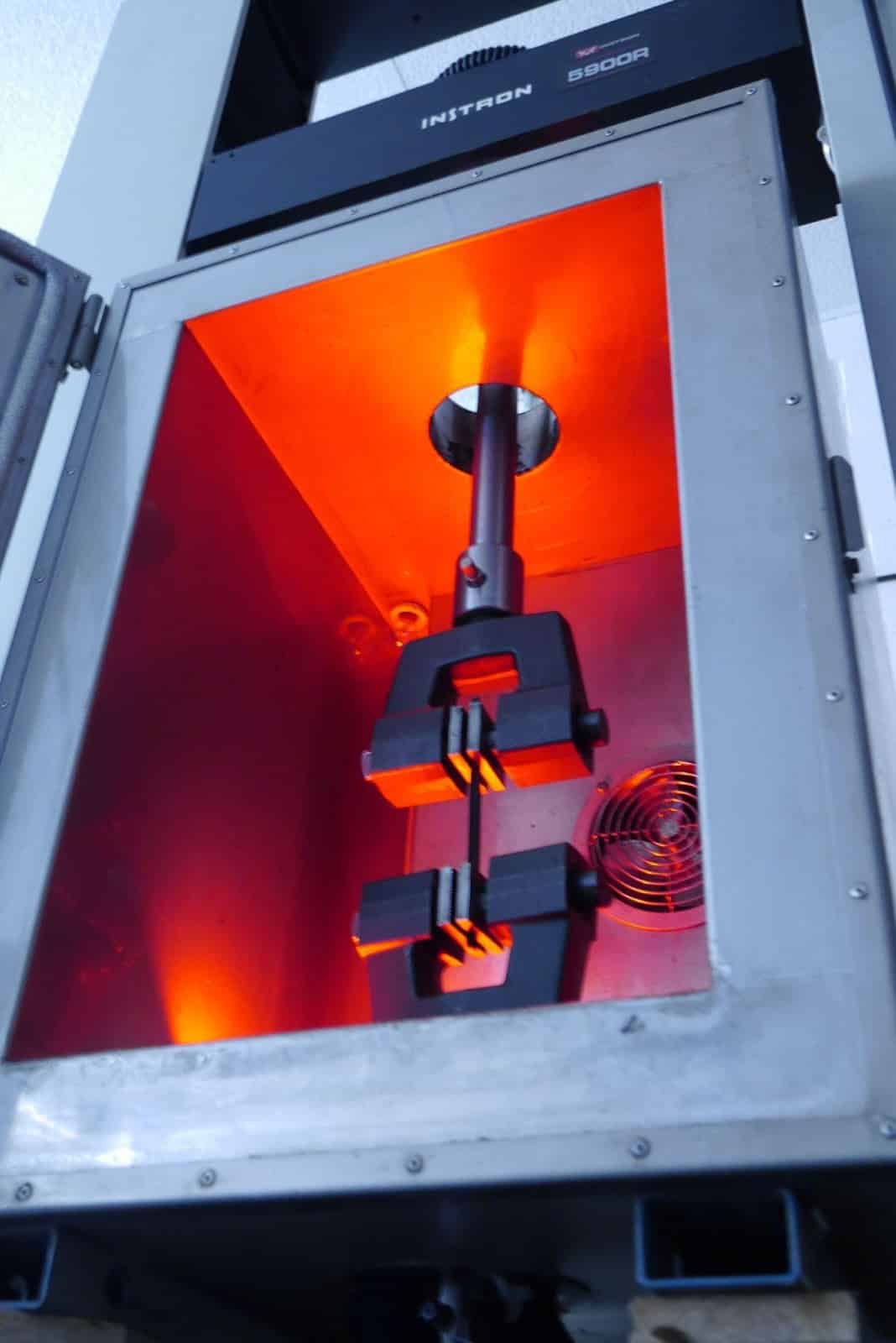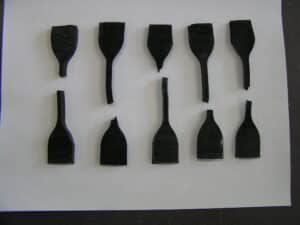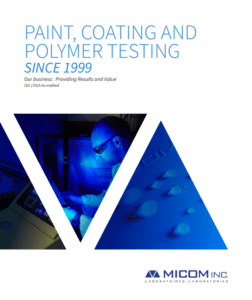Physical and Mechanical Testing of Polymers
Micom Laboratories specializes in comprehensive physical and mechanical testing services for polymers, serving key industries such as aerospace, automotive, medical, and military across Canada and the United States. Our expertise covers a wide range of tests, including tensile testing, impact testing, polymer hardness testing, and various ASTM standard tests.
As an ISO/IEC 17025-accredited laboratory with over 25 years of experience in material testing, we guarantee the highest standards of quality and reliability in our testing procedures. You can rely on our laboratory to provide fast, accurate, and reliable physical and mechanical testing services for your polymers that will meet your needs.
Why Perform Physical and Mechanical Testing of Polymers
For manufacturers, testing polymers before going to market offers multiple benefits. Micom Laboratories’ physical and mechanical testing services of polymers are designed to assist you in your product development process.
- Ensure material compliance with industry specifications: We rigorously test polymers against established standards and specifications to ensure they meet your industry’s performance and quality criteria.
- Predict the durability and performance of materials and products: Our testing procedures simulate real-life conditions and stresses on your polymers, allowing us to predict long-term performance and help you anticipate and resolve potential issues before they occur. Performance over time is of paramount importance, this is why ee offer accelerated aging services that allow to quantify performance loss as a function of time in the field and/or excessive use.
- Assess the quality of raw materials from suppliers: Our testing services can verify the properties and consistency of polymer raw materials from your suppliers to help you maintain the integrity of your supply chain and ensure your chosen materials meet your exact specifications.
- Optimize material selection based on behavior under mechanical stresses: By subjecting polymers to various mechanical tests, we can provide detailed insights into how different materials behave under specific conditions. This information is crucial for selecting the most suitable polymer for your application, balancing factors such as strength, flexibility, and durability.

List of Physical and Mechanical Properties Tests We Offer
| Property Testing | Definition | Associated Testing Methods |
| Tensile Testing | Evaluates a polymer’s behavior under tension, measuring properties such as tensile strength, elongation at break, and elastic modulus. This test helps predict how polymers will perform under stress in applications like fibers, films, and structural components. | ASTM C297
ASTM D412 & ISO 37 ASTM D638 & ISO 527 ISO 1798 |
| Compression Testing | Assesses a polymer’s response to compressive forces, important for materials used in load-bearing applications. This test is particularly relevant for rigid polymers and polymer foams used in packaging, construction, and automotive industries. | ASTM D695 & ISO 604
ASTM D1621 & ISO 844 ASTM D5467 ASTM D6641 |
| Flexural Testing | Also known as bending tests, this method evaluates a polymer’s ability to resist deformation under load. It’s essential for polymers used in applications where bending stress is common, such as in furniture, automotive panels, and construction materials. | ASTM D790 & ISO 178
ASTM D7249 |
| Impact Resistance Testing | Measures a polymer’s ability to absorb energy during fracture using methods like Charpy and Izod impact tests. This is helpful for polymers used in safety-critical applications, such as protective gear, automotive components, and consumer electronics casings. | ASTM D1709 & ISO 7765-1
ISO 179 |
| Shear Strength Testing | Measures a polymer’s resistance to internal sliding forces which is important for evaluating adhesives, laminated structures, and composite materials used in aerospace, construction, and automotive industries. | ASTM C393
ASTM D732 |
| Peel Testing | Evaluates the bond strength between polymer layers or between a polymer and another material. It is helpful for assessing the performance of polymer adhesives, laminates, and coatings in applications such as packaging, automotive parts, and electronic components. | ASTM D1781
ASTM D3330 |
| Tear Testing | Measures a polymer’s resistance to tearing when subjected to tensile stress. This test helps evaluate the durability of polymer films, sheets, and thin materials used in applications like food packaging, protective coverings, and flexible containers. | ASTM D624
ASTM D1922 |
| Adhesion | Assesses how well a polymer coating or adhesive bonds to a substrate. This test is essential for evaluating the effectiveness of polymer-based paints, coatings, and adhesives used in industries such as automotive, construction, and consumer goods. | ASTM C297
ASTM D3330 |
| Abrasion | Determines a polymer’s resistance to surface wear caused by rubbing or scraping. This test is beneficial for polymers used in high-wear applications such as flooring, automotive interiors, and industrial conveyor belts. | ASTM D4060
ISO 7784-2 |
| Friction | Measures the coefficient of friction between a polymer surface and another material. For example, for polymers used in applications requiring specific slip characteristics, such as packaging materials, artificial joints, and automotive parts. | ASTM D1894
ISO 8295 |
| Density/Gravity | Determines the mass per unit volume of a polymer. This test is used for quality control in polymer production, helping to identify inconsistencies in formulation or processing that might affect the final product’s performance. | ASTM D792 |
| Water Absorption | Measures the amount of water a polymer absorbs when immersed. This property is critical for polymers used in humid environments or water-contact applications, such as outdoor equipment, marine components, and some medical devices. | ASTM D570
ASTM D870 |
| Hardness Testing | Determines a polymer’s resistance to indentation, often using Shore or Brinell hardness tests. This property is evaluated for polymers used in applications requiring wear resistance, such as flooring, protective coatings, and durable goods. | ASTM D2240
ISO 868 |
| Accelerated Weathering | Simulates long-term outdoor exposure effects on polymers, including UV radiation, heat, and moisture. It helps predict the longevity and performance of polymers used in outdoor applications such as construction materials, automotive exteriors, and outdoor furniture. | ASTM D2565
GMW14162 |
Ask Our Material Testing Experts
With decades of experience and state-of-the-art equipment, such as Instron machines and climatic chambers, our experts are ready to assist you with all your polymer mechanical testing needs. Request your free consultation today to discuss how Micom’s accredited testing services can help ensure your polymers meet the highest industry standards.

Our Physical and Mechanical Polymer Testing Process
- Initial consultation to understand your specific needs & industry requirements
- Detailed testing proposal with recommended testing standards, timeline, and cost estimate
- Careful sample preparation and rigorous testing procedures
- Comprehensive reporting of results in a clear and easy-to-understand format
- Valuable insights and recommendations from our experts based on test results
Polymer Testing By Industry
Polymers play an important role in many industries. Here’s an overview of the components we can test by industry.
- Automotive: Interior components (dashboards, door panels), exterior parts (bumpers, body panels), under-hood components (fuel lines, electrical insulation).
- Medical: Tubing for various medical devices, disposable medical supplies (syringes, gloves), prosthetics and implants, packaging for medical equipment and pharmaceuticals.
- Aerospace: Interior panels and components, insulation materials, seals, and gaskets.
- Generic: packaging materials, rubber products, plastic pipes, consumer goods.
- Electronics: Printed circuit boards (PCBs), connector housings, cable insulation, touchscreen components, and device casings.
- Military: Protective gear (helmets, body armor), composite materials for vehicles and aircraft, specialized coatings, communication equipment housings, etc.
More About Polymer Testing
Micom Laboratories offers comprehensive polymer testing services, including specialized services for plastics, composites, and adhesives. Our expertise extends to simulating real-world conditions through accelerated aging and UV testing, ensuring your materials perform optimally over time.
For a quick overview of our paint, coating, and polymer testing services, download our brochure.
Frequently Asked Questions
What types of polymers can you test?
Micom Laboratories can test the mechanical and physical properties of a wide range of polymers, including thermoplastics, thermosets, elastomers, adhesives, and composites.
What is the typical turnaround time for physical and mechanical testing of polymers?
Polymer testing turnaround time varies by test complexity. Generally, 1-2 weeks for standard tests.
Can you test both raw materials and finished products?
Yes, we test both raw polymeric materials and finished polymer products to ensure they meet the required specifications and standards.
What sample sizes or quantities do you require for physical and mechanical testing of polymers?
Sample sizes vary depending on the test type. Generally, multiple specimens, each a few inches in size, are required.
Do you offer environmental conditioning before testing?
Yes, Micom offers environmental conditioning of polymer samples before testing. We have climatic chambers that enable us to condition your samples under varying conditions of temperature, humidity, pressure, and altitude.
Can you test polymers for specific properties like UV resistance?
Yes. As a material testing laboratory, Micom offers comprehensive accelerated aging testing services, including UV testing. We also offer temperature aging, creep testing, and water and humidity resistance testing.
Can you perform high-temperature or low-temperature testing?
Both. Micom Laboratories is equipped with six climatic chambers, allowing us to simultaneously perform multiple high- and low-temperature tests on polymers. We can test at temperatures as low as -78 °C and as high as +200 °C.
Can you perform custom or non-standard polymer tests tailored to our specific application?
As a polymer testing laboratory, Micom understands that every customer's application and requirements are unique. Our polymer experts can design custom testing protocols to evaluate polymer physical and mechanical properties relevant to your specific application. Contact us to get more information on our custom testing services.
Can you assist with failure analysis of polymer products?
Yes, our experts can assist with failure analysis of polymer products. Our process includes examining the failed components, identifying the root causes, and making recommendations to solve the problem. Our goal is to prevent future failures and improve product performance and reliability.


